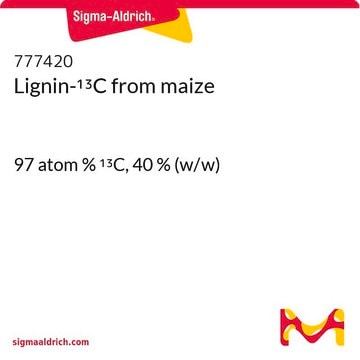370959
Lignin, alkali
Synonyme(s) :
Lignin, kraft
About This Item
Produits recommandés
Description
surface tension 43 mN/m (1% aqueous)
Niveau de qualité
Forme
powder
Impuretés
5% moisture
Perte
13.4 wt. % loss on heating, @ 316°C
3.3 wt. % loss on heating, @ 149°C
5.7 wt. % loss on heating, @ 204°C
8.5 wt. % loss on heating, @ 260°C
pH
6.5 (25 °C, 5%, aqueous solution)
Température de transition
sintering point 188 °C
Solubilité
NaOH: 0.05% (warm 5% aquesous)
MEK: partially soluble
benzene: insoluble
dioxane: soluble
ethylene glycol: soluble
hexane: insoluble
methanol: partially soluble
Densité
1.3 g/mL at 25 °C
Masse volumique apparente
23 lb/cu.ft (loose)
32 lb/cu.ft (packed)
Vous recherchez des produits similaires ? Visite Guide de comparaison des produits
Catégories apparentées
Description générale
Application
Code de la classe de stockage
11 - Combustible Solids
Classe de danger pour l'eau (WGK)
WGK 3
Point d'éclair (°F)
Not applicable
Point d'éclair (°C)
Not applicable
Équipement de protection individuelle
Eyeshields, Gloves, type N95 (US)
Faites votre choix parmi les versions les plus récentes :
Certificats d'analyse (COA)
Vous ne trouvez pas la bonne version ?
Si vous avez besoin d'une version particulière, vous pouvez rechercher un certificat spécifique par le numéro de lot.
Déjà en possession de ce produit ?
Retrouvez la documentation relative aux produits que vous avez récemment achetés dans la Bibliothèque de documents.
Notre équipe de scientifiques dispose d'une expérience dans tous les secteurs de la recherche, notamment en sciences de la vie, science des matériaux, synthèse chimique, chromatographie, analyse et dans de nombreux autres domaines..
Contacter notre Service technique







